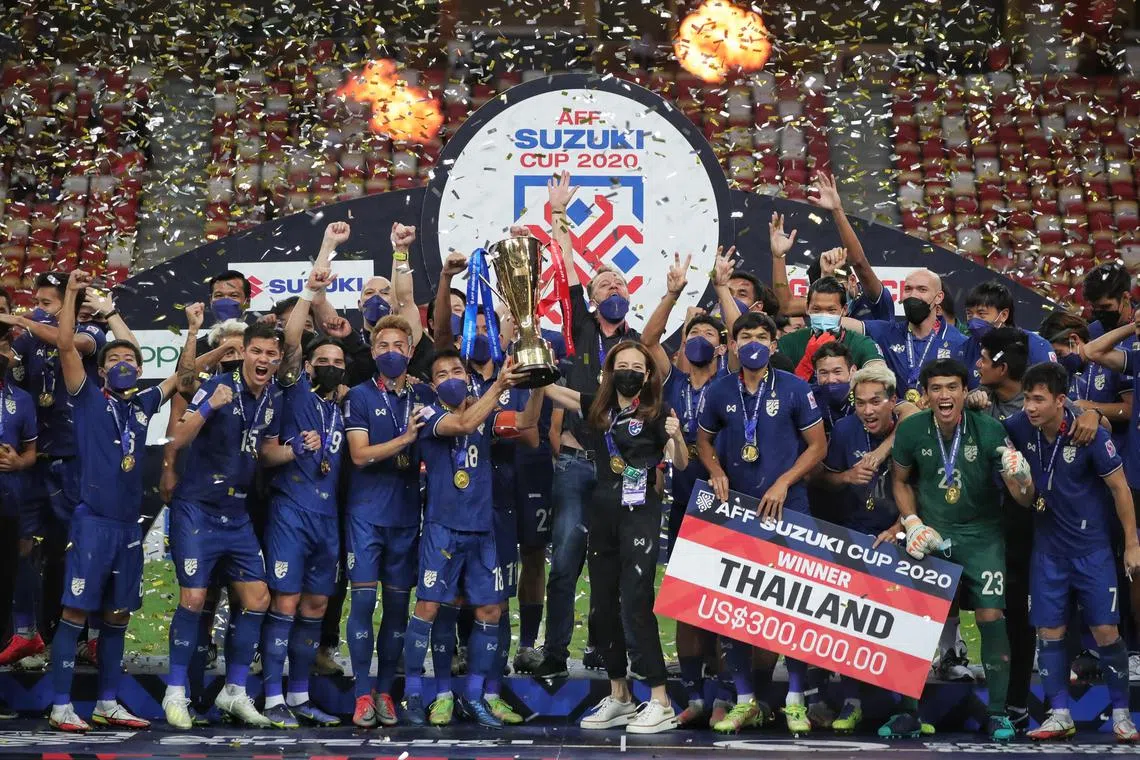Has the Asean Championship lost its shine? Here’s what football experts say
Sign up now: Get the biggest sports news in your inbox

Thailand’s captain Chanathip Songkrasin (No. 18) and his teammates lifting the trophy after defeating Indonesia to win the AFF Suzuki Cup at the National Stadium on Jan 1, 2022.
PHOTO: ST FILE
Follow topic:
SINGAPORE – The Tiger Cup, Suzuki Cup and now the Asean Mitsubishi Electric Cup. The Asean Championship has taken on different names since its inception in 1996, but what remains constant is its status as South-east Asia’s premier football tournament.
But ahead of its 15th edition from Dec 8 to Jan 5, the championship’s shine is fading for some.
Football consultant Richard Harcus, who is based in South-east Asia, noted that there are multiple reasons why the tournament is going downhill.
He said: “National teams don’t put their best teams forward, or are restricted from doing so by the players’ parent clubs.
“Then there is the fact that teams are not playing in their own national stadiums (Indonesia and Vietnam) and some not even in their home country (Timor-Leste). This takes away from the spectacle.”
The tournament does not fall during an official Fifa international window and hence clubs are not obliged to release their players. Given that the region’s top clubs are already involved in domestic leagues and cups, as well as the Asian Champions League and Asean Club Championship, it comes as no surprise that some decide that players should sit out the tournament.
While Singapore and Vietnam have temporarily paused their domestic leagues for the championship, league competitions in Indonesia, Malaysia, and Thailand will continue. This has resulted in weakened squads for the key contenders, as well as four-time champions Singapore.
The Lions are in Group A with defending champions Thailand, Malaysia, Cambodia and Timor-Leste while Indonesia, the Philippines, Vietnam, Laos and Myanmar are in Group B. All teams will play two matches at home and two away during the group stage. The top two teams from each group will advance to the two-legged semi-finals on Dec 26 and 29, or Dec 27 and 30, and the final will be staged on Jan 2 and 5.
While football observers like Harcus may lament the dip in standards, veteran former coach Steve Darby, who worked with Thailand for the 2008 edition, disagreed that the tournament has lost its shine, especially among fans.
Darby, who is backing one of “the big four” of Vietnam, Thailand, Malaysia or Indonesia to win the latest edition, said: “I don’t think it’s lost its sparkle to the fans. To be honest, four nations have a realistic chance of winning the competition and fans love winning.
“The Asean football fans are not stupid and they know they are not going to win a World Cup or even Asian Cup, so to win a competition is a rare and enjoyable occurrence, and the Asean Championship provides that.”
Fans may not get to catch star players like Johor Darul Takzim winger Arif Aiman and BG Pathum United playmaker Chanathip Songkrasin in action this time, but their absences will give others a chance to step up.
Defending champions and record seven-time winners Thailand, led by Japanese coach Masatada Ishii, take on Timor-Leste in their opening game in Group A. The War Elephants’ squad is headlined by Hokkaido Consadole Sapporo midfielder Supachok Sarachat and his brother, Buriram United forward Suphanat Mueanta, though only seven of the 26-man squad were part of their championship-winning team two years ago.
Seventeen players have earned 15 caps or less, and they include fullbacks Nicholas Mickelson and James Beresford – who were born in Norway and England respectively – and Sweden-born striker Patrik Gustavsson.
Malaysia, who are without their JDT regulars, could rely on a South-American flavoured midfield comprising naturalised players such as Paulo Josue and Endrick dos Santos (both born in Brazil), and Sergio Aguero (Argentina).
Singapore will be missing the services of Thailand-based players Harhys Stewart and the Fandi brothers Ikhsan, Irfan and Ilhan. But they are boosted by the timely naturalisation of Japan-born central midfielder Kyoga Nakamura, who delivered a Man-of-the-Match performance on his debut in November, when the Lions beat Myanmar 3-2 in a friendly.
Cambodia will be boosted by their foreign-born players: Defenders Takaki Ose and Hikaru Mizuno and midfielder Yudai Ogawa (Japan), forward Coulibaly Abdel Kader (Ivory Coast) and defender Faeez Khan (South Africa), and Neto Rondon (Colombia). Usually the region’s whipping boys, they could give their Group A opponents a run for their money.
In Group B, the Philippines, who also boast a host of naturalised players such as Norway-born forward Bjorn Martin Kristensen, and Myanmar can conjure an upset on their day but face an uphill task trying to qualify ahead of Vietnam and Indonesia.
Ironically, while most of the region’s top teams will be counting on their naturalised and heritage players, Indonesia will not be able to do so. A recent influx of Europe-born heritage players helped the side make the third round of Asian qualifiers for the 2026 World Cup, but only Netherlands-born forward Rafael Struick has been released by his club, Brisbane Roar, for the tournament.
Still chasing an elusive first Asean title, Indonesia have named a squad consisting of mainly players from their national Under-22 team, although the inclusion of Oxford United’s Marselino Ferdinan – who scored twice in a recent shock victory over Saudi Arabia – is a significant boost.
Unlike the other nations, twice winners Vietnam will have their best available side, which includes midfielder Nguyen Quang Hai and forward Nguyen Tien Linh.
South Korean Kim Sang-sik, who took charge in May, could also have an ace up his sleeve in Brazil-born striker Nguyen Xuan Son (Rafaelson), who recently met Fifa and Asean Football Federation requirements to represent Vietnam.
But Harcus is hesitant to call Vietnam the favourites for the title.
He said: “I think Thailand will be strong and Indonesia have strength in depth. Vietnam are hungry to win it back, but I hope there are a few surprises in the tournament.
“Albert Capellas of the Philippines has done such a great job in such a short space of time and they may shock a few people.
“I’d deeply love to see Singapore do well too, but I don’t think they are quite there yet. Cambodia have some good youth... and could be a country to watch out for.”


